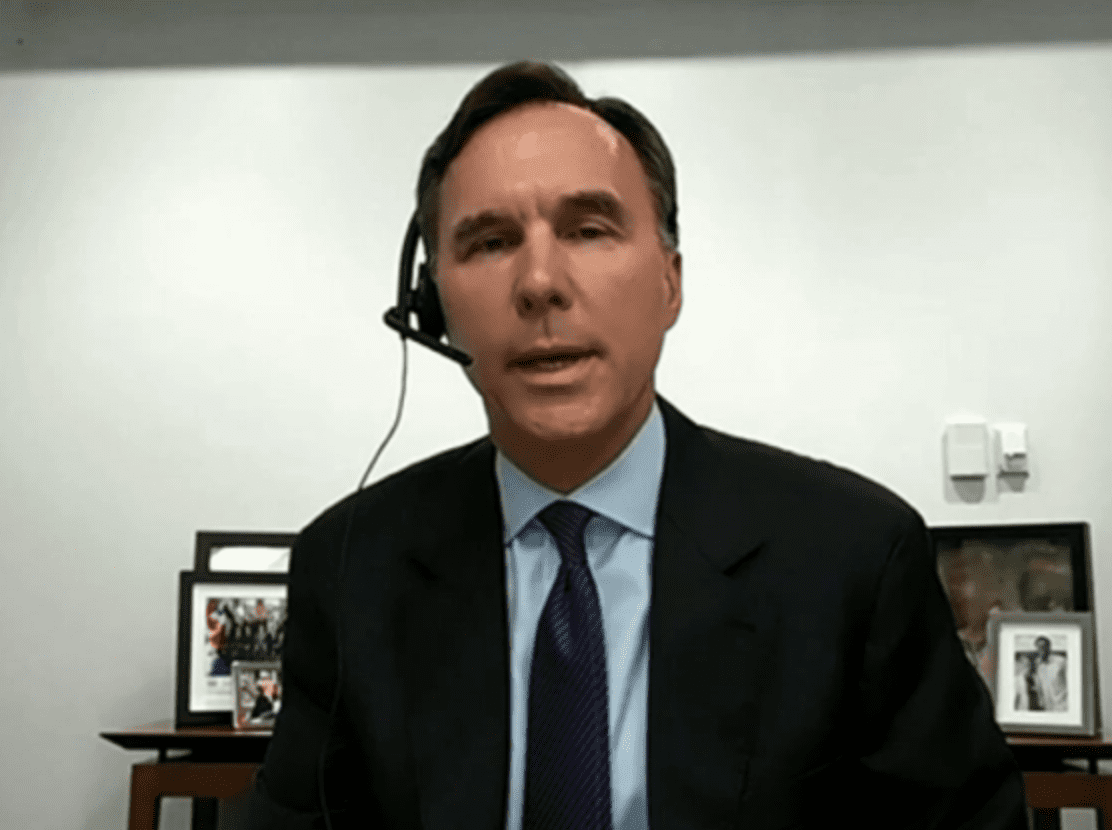Periodically amid all the bad news you glimpse something worse. For instance, behind the clowns and juggling acts of the WE scandal up on deck I see rocks ahead. Including that public servants just furtively scored a big pay raise during an appalling economic crisis.
Actually furtively might not be quite the right word. They're boasting about it. But it's hard to focus on when I no sooner called the WE scandal dull than by golly those unreliable politicians did their best to prove me wrong, including Bill "Villa Man" Morneau forgetting to reimburse WE for three years then remembering just in time to appear before a Parliamentary Committee and wondering how anyone could doubt his integrity.
It matters. As I wrote in the National Post recently, the opposite of funny isn't serious, it's not funny, and if we don't muster sufficient indignation to punish such shenanigans we really can replace the maple leaf with a banana on our flag. But it is, after all, just a bunch of politicians we foolishly trusted. We can foolishly trust others next time.
Replacing the whole government and political culture is a lot harder. And less amusing. But it's necessary because that pay raise at a time of record private-sector job losses due to COVID-19 is just one brazen "Qu'ils mangent de la brioche" manifestation of the increasing isolation and self-conceit of our increasingly parasitic public-sector class.
One does not lightly invoke the French revolution. And I do not think it will end in violence. But it is very destructive of social cohesion for those in the ruling class to flaunt their privilege and not even know they're doing it.
I realise parasitic is a strong word. But consider that this hefty pay raise came on top of another shocking story. The CBC, on the ball for once despite being part of that privileged public sector, just revealed that "More than a quarter of all federal public servants were granted paid time off work during the first 11 weeks of the COVID-19 pandemic, at an estimated cost of $439 million."
Got that? More than a quarter of federal public servants were collecting their salaries for not working during the pandemic at a cost of nearly half a billion dollars to those of us somehow still working.
It's strange since we heard a lot of self-congratulatory rhetoric from the public service about how our wonderful public service was stepping up during the pandemic to maintain and create critical programs. (Except the one they supposedly told cabinet should be farmed out to WE which alone could deliver it; perhaps if a quarter of those hard-working, dedicated, highly-trained agents of change hadn't been lounging by the pool they could have tackled that job). But it's even stranger in that, as the government went into crisis mode in the face of new challenges, hurling money out the door so fast the shovels melted, creating a projected $343-billion deficit, fully a quarter of our bureaucrats could go take a long nap and nobody noticed.
Admit it. You didn't realize they'd gone. Raising the very real question what exactly it is that they do all day except take in one another's memos.
Oh right. They accumulate pension entitlements. Silly me.
Of course it's important that, as the PM keeps saying, we're all "in this together". It's just that some of us are down in the galley rowing for dear life while others recline on deck sipping cool beverages. Nice tall ones that just got refilled, as the politicians and their bureaucratic cronies just awarded 6.64%, largely retroactive pay increases to some 100,000 public servants.
OK. Hands up everyone in the private sector who just got handed a 6% raise for 2018, 2019 and 2020 and enjoys unshakeable job security. Oh right. You can't raise your hands. Chained to the oars.
What's alarming is not just that the public sector is increasingly an insupportable burden on productive activity rather than a support to it, its record swollen numbers enjoying phenomenal wages, pensions and benefits at the expense of a drained private sector. It's that its members have become so arrogant that instead of acknowledging their privileged they overlook it with something approaching wilful obtuseness.
For instance, when the CTF's Aaron Wudrick just asked whether it was reasonable for private sector workers to take layoffs while government workers took paid leave, some union spokesperson tossed back that Wudrick was now "an accidental lefty" who had suddenly realized private firms "should also treat workers like humans" instead of cutting jobs just because they had no customers or revenue and unlike government can't just print money.
Those in the public sector are increasingly out of touch about basic facts. And in an unhealthy symbiosis where the Clerk of the Privy Council, Ian Shugart told a Parliamentary committee there was nothing to see on the WE scandal because after all everybody knew Trudeau and WE were entwined like a vine and a trellis so there was no conflict of interest. Perhaps he doesn't know what one is, in the same way that fish don't know they're in water.
It's not just individuals. The public service and the politicians are also so entwined as to be increasingly hard to distinguish let alone separate. As former senior civil servant Philip Cross just wrote in the Financial Post, the tendency of senior public servants to become leading Liberal lights is very pronounced in Canada and Mark Carney might be next. (Unless he too has a big bag of unpaid WE receipts or something.)
For years people have been warning, or trying to warn, that if we don't change course there will one day be a shipwreck over unsustainable public sector pensions. Indeed, the last federal deficit before the pandemic was almost $7 billion higher than forecast because of unexpected pension costs.
Even the ostensible national debt might scare any reasonable person. But our federal and provincial governments are secretly in a much worse financial position because of hundreds of billions of dollars in unfunded liabilities to let those overworked, underappreciated public servants retire in their late 50s and buy sailboats with their defined-benefit pensions from which they wave cheerily as they cruise past the galley slaves.
If we were smart, and all in this mess together, we would put the unfunded liabilities on the books with a plan for repaying them, and cut wages, pensions and job security to make it happen before we hit a rock. Instead the view from the deck is that those lazy dogs down below should just row harder and complain less. Waiter, more champagne.
At this rate one day soon we will crash into something hard and the whole self-satisfied aristocratic circus will go overboard in a spectacle at once funny and tragic.








